UAE's Residential Property Market Analysis 2025
While the market prepares to absorb the substantial pipeline of residential projects under development, robust demand supported by population growth and the influx of wealthy foreign residents continues to drive up sales prices and rents in Dubai and Abu Dhabi.
This extended overview from Global Property Guide covers key aspects of the housing market in the United Arab Emirates and takes a closer look at its most recent developments and long-term trends.
Table of Contents
- Housing Market Snapshot
- Demand Highlights
- Supply Highlights
- Rental Market
- Mortgage Market
- Socio-Economic Context
Housing Market Snapshot
The Dubai residential market continued its upward trajectory, with the Residential Market Sales Price Index reported by REIDIN rising by 15.60% year-on-year. Apartment prices registered a 15.22% annual increase, while villa prices rose by 17.81%. "This sustained increase has been fueled by strong demand from a diverse buyer base, including investors, end-users, particularly first-time homeowners," commented experts from Cavendish Maxwell, adding that growth has also been supported by developer-led incentives and ongoing government initiatives, both of which have helped strengthen buyer confidence.
United Arab Emirates' house price annual change:
Data Source: REIDIN.
Comparable trends were observed in Abu Dhabi, the UAE's second-largest housing market, where the Residential Market Sales Price Index rose by 18.16% year-on-year. Apartment prices grew by 18.17% annually, while villa prices increased by 17.19%. "While transactional volumes softened, demand remained strong, supported by both investor confidence and consistent end-user interest. This resilience is driven by a stable macroeconomic environment and competitive rental yields, particularly in prime locations," commented Cavendish Maxwell. Experts further noted that efforts by both the Abu Dhabi Government and developers, such as flexible payment plans, infrastructure development, long-term residency options, and initiatives to enhance quality of life, have continued to stimulate buyer activity and support price growth.
According to the real estate portal Property Finder, median asking prices as of Q1 2025 showed a 12% year-on-year increase in Dubai's apartment segment, largely driven by gains in larger units. Two-bedroom apartments rose by 17%, while three-bedroom units saw a 10% increase, reflecting growing demand from end-users and families seeking more spacious living. In the villa segment, the market continued to shift toward larger homes in premium and established communities, with median asking prices rising by 8% year-on-year.
In Abu Dhabi, asking prices rose at a faster pace, with the apartment segment recording a 23% year-on-year increase, primarily driven by significant gains in smaller units. Villa prices rose by 18% annually, with performance differing widely by location and unit size.
Median asking price by unit type and submarket:
| Unit type | Dubai | Abu Dhabi | ||||
| Q1 2025 (AED) | Q1 2025 (USD) | YoY Change, % | Q1 2025 (AED) | Q1 2025 (USD) | YoY Change, % | |
| Apartments | ||||||
| Studio | AED 700,000 | USD 190,606 | 11.11% | AED 930,000 | USD 253,233 | 32.86% |
| 1-bedroom | AED 1,280,000 | USD 348,536 | 10.34% | AED 1,250,000 | USD 340,368 | 28.87% |
| 2-bedroom | AED 2,170,000 | USD 590,878 | 17.30% | AED 2,000,000 | USD 544,588 | 21.95% |
| 3-bedroom | AED 3,970,000 | USD 1,081,007 | 10.28% | AED 2,550,000 | USD 694,350 | 14.35% |
| Villas | ||||||
| 3-bedroom | AED 2,900,000 | USD 789,653 | 18.37% | AED 3,400,000 | USD 925,800 | 21.43% |
| 4-bedroom | AED 3,900,000 | USD 1,061,947 | 6.85% | AED 5,300,000 | USD 1,443,159 | 19.10% |
| 5-bedroom | AED 13,540,000 | USD 3,686,862 | 7.63% | AED 8,600,000 | USD 2,341,729 | 14.67% |
| Exchange rate USD 1 = AED 3.6725. | ||||||
| Data Source: Property Finder. | ||||||
Population growth and the influx of ultra-high-net-worth individuals and family offices into the UAE continue to support robust demand for residential properties, particularly in prime markets where supply constraints are exerting upward pressure on both capital and rental values. However, as noted by experts from Savills, high levels of development activity in both Dubai and Abu Dhabi, with significant supply expected towards the end of 2025, are likely to ease the sharp price appreciation seen in recent years.
Fitch Ratings anticipates a moderate correction in Dubai beginning in the second half of 2025, as the projected volume of new units is expected to outpace the city's population growth. Nonetheless, prime areas such as Palm Jumeirah and Downtown Dubai are expected to remain resilient due to their desirability and limited supply. At the same time, strong underlying fundamentals, such as ongoing population growth and economic diversification, continue to support long-term demand in Dubai's real estate sector, averting a market crash and signaling a transition toward a more mature phase of the market.
Demand Highlights:
Robust Demand in Dubai Counters Abu Dhabi's Off-Plan Sales Dip
Residential sales activity in Dubai remains robust. According to the latest figures from the Dubai Department of Land, compiled by DXB Interact, 94,000 residential sales transactions were registered during the first half of 2025, representing a 23.04% year-on-year increase in transaction volume. A similar trend was observed in transaction value, which reached AED 262.7 billion (USD 71.5 billion), marking a 37.68% increase over the same period last year.
"Investors remain attracted to the market's potential for stable returns and capital appreciation, while more end-users are choosing to purchase rather than rent - likely influenced by increasing rental prices and growing concerns over long-term affordability," commented experts from Cavendish Maxwell.
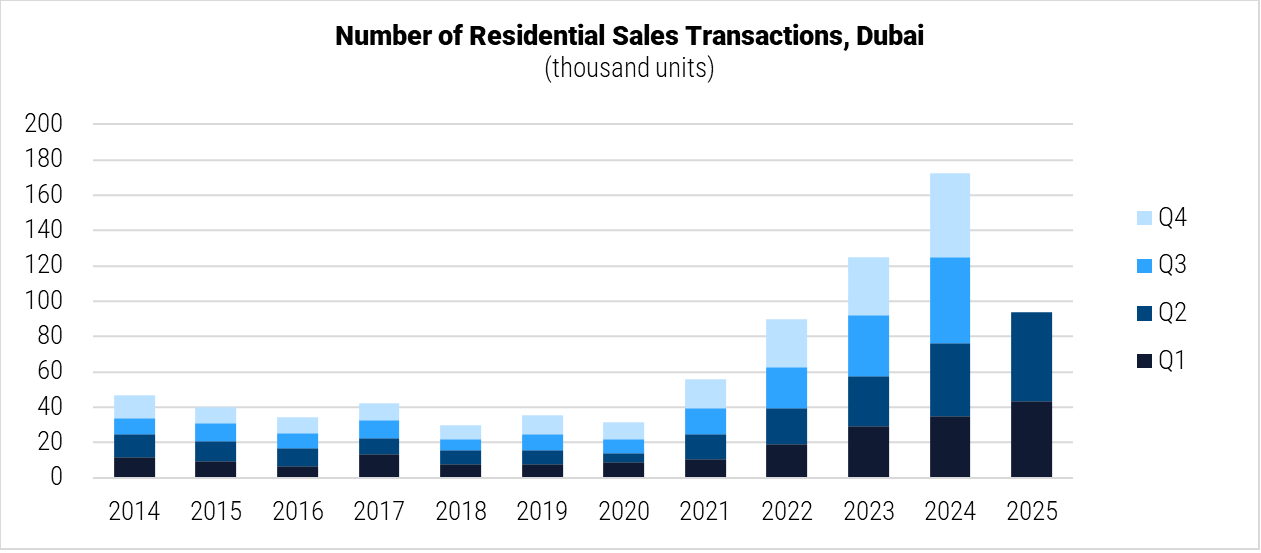
Data Sources: Dubai Land Department, DXB Interact.
Apartments accounted for the majority of transactions, comprising 78% of the total volume and 55% of the value. However, their market share has been gradually declining, driven by rising demand for larger homes. "Many end-users, particularly families, are seeking more space as they plan to settle in the city for the long term. At the same time, investors are increasingly targeting these larger properties, recognizing their appeal to a rising tenant base of families and long-term residents," noted Cavendish Maxwell. Off-plan sales continued to outpace transactions for ready properties across both segments.
According to Property Finder data for Q1 2025, Business Bay, Downtown Dubai, Dubai Marina, Jumeirah Village Circle, and Palm Jumeirah emerged as the most preferred locations for apartment buyers. For villas, top choices included Al Furjan, Damac Hills 2, Dubai Hills Estate, Palm Jumeirah, and Dubailand.
Residential sales by type, Dubai:
| Residential Sales Volume (no.), H1 2025 |
YoY, % H1 2025 vs H1 2024 |
Residential Sales Value (AED B), H1 2025 |
Residential Sales Value (USD B), H1 2025 |
YoY, % H1 2025 vs H1 2024 |
|
| Apartments | 73,573 | 16.22% | AED 144.19 | USD 39.26 | 20.91% |
| Off-plan | 50,099 | 18.97% | AED 102.28 | USD 27.85 | 23.98% |
| Ready | 23,474 | 10.75% | AED 41.90 | USD 11.41 | 14.02% |
| Villas | 20,415 | 55.42% | AED 118.55 | USD 32.28 | 65.58% |
| Off-plan | 10,876 | 31.42% | AED 66.98 | USD 18.24 | 44.74% |
| Ready | 9,539 | 96.32% | AED 51.57 | USD 14.04 | 103.68% |
| Exchange rate USD 1 = AED 3.6725. | |||||
| Data Sources: Dubai Land Department, DXB Interact. | |||||
In the city of Abu Dhabi, 3,100 residential sales transactions were recorded in the first half of the year, according to the Digital Real Estate Ecosystem (DARI) by the Abu Dhabi Real Estate Centre, reflecting a 36.65% year-on-year decline. This decrease was largely attributed to a 72.62% drop in off-plan sales, driven by a limited number of new project launches. In contrast, demand for completed properties rose by 22.61%.
Commenting on the trend, experts from Cavendish Maxwell stated: "While ready transactions activity is expected to remain steady throughout the year, the performance of the off-plan segment will depend on the scale and timing of project launches."
Property Finder data for Q1 2025 showed that Al Raha Beach, Al Reem Island, Masdar City, Saadiyat Island, and Yas Island were the most sought-after locations for apartment buyers in Abu Dhabi. Preferred villa destinations included Al Reef, Al Reem Island, Khalifa City, Saadiyat Island, and Yas Island, both for investment and end-user demand.
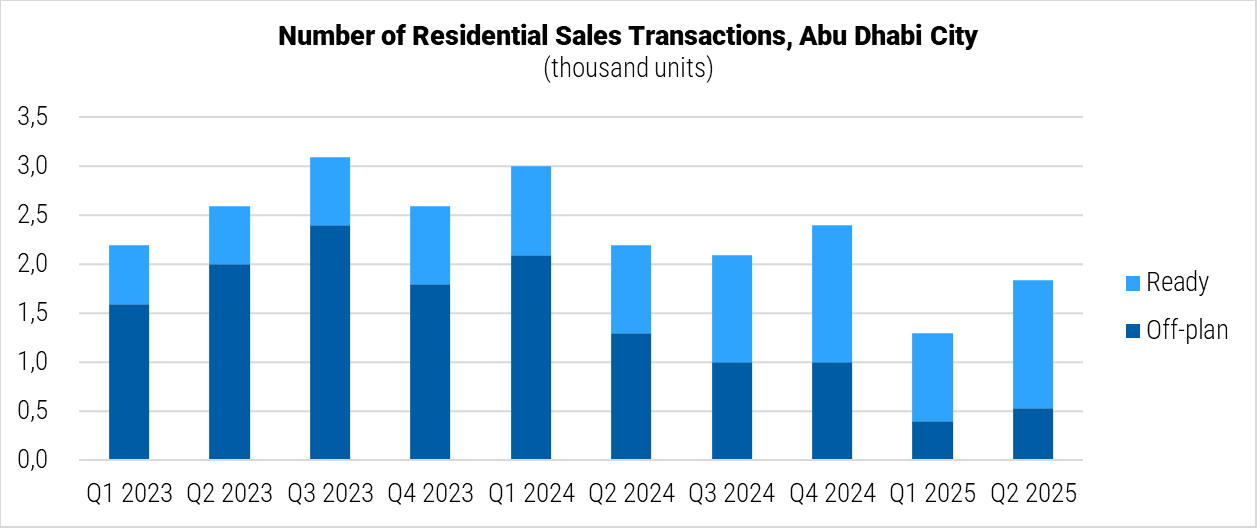
Note: Residential sales include apartment, duplex, townhouse, and villa property types.
Data Sources: DARI.
Looking ahead, the outlook for both the Dubai and Abu Dhabi real estate markets remains positive, supported by sustained interest from investors and end-users, ongoing economic diversification, proactive government policies, and a continuous influx of residents driven by employment growth and long-term residency initiatives.
Commenting on macroeconomic factors, experts from CBRE noted: "Whilst the tariff impact on the real estate market remains unclear, one potential outcome is a lower dollar, which would ultimately make the UAE's residential sector more affordable and attractive for many foreign investors, on top of the already positive attributes."
Among the key advantages for real estate investors in the UAE are eligibility for a 10-year Golden Visa through property ownership of at least AED 2 million, including off-plan and mortgaged properties that meet payment thresholds, minimal purchase and exit taxes, and a built-in currency hedge.
Supply Highlights:
Key Submarkets Drive Pipeline as Delivery Momentum Persists
According to Property Monitor's data compiled by Cavendish Maxwell, approximately 9,400 residential units were completed in Dubai in the first quarter of 2025, representing a 4.44% year-on-year increase and marking the second-highest quarterly completion volume in the past two years, surpassed only by the fourth quarter of 2023. Apartments accounted for 79% of the total, with the remainder comprising villas and townhouses.
The submarkets recording the highest number of completions in Q1 2025 included Jumeirah Village Circle (2,433 units), Mohammed Bin Rashid City (1,037 units), Business Bay (743 units), Downtown Jebel Ali (647 units), and Rukan (636 units).
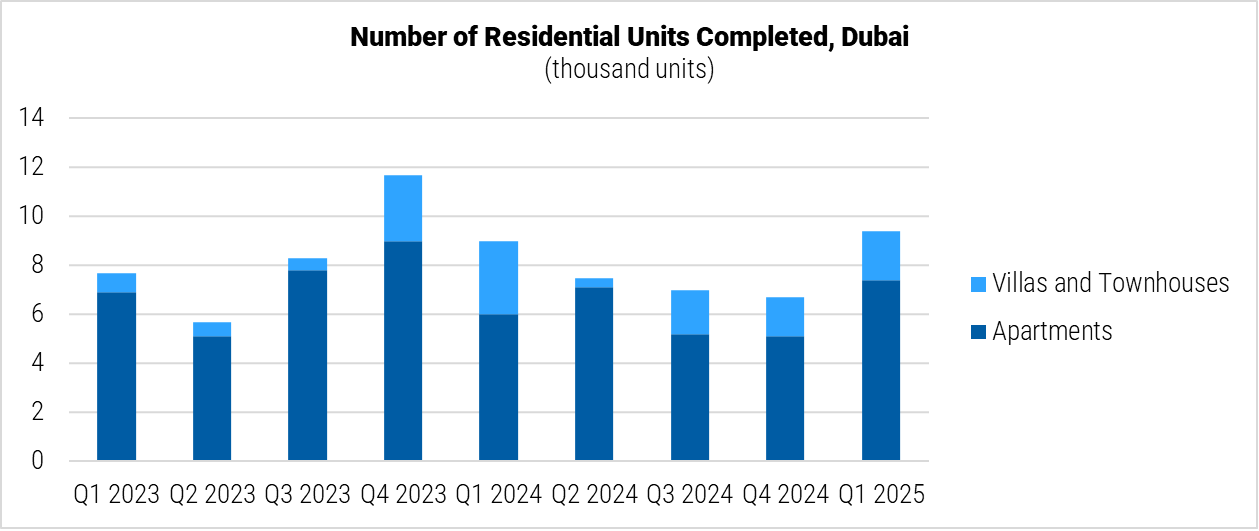
Data Sources: Property Monitor, Cavendish Maxwell.
Looking ahead, Dubai's housing supply is expected to expand significantly, with nearly 300,000 units projected to enter the market by 2028. A substantial portion of this supply is scheduled for 2026 and 2027, suggesting a potential surge in completions during those years.
Over the remainder of 2025, approximately 73,000 units are expected to be delivered; however, actual completions may be influenced by shifting market dynamics, evolving buyer preferences, and possible delays in construction timelines. "Given these factors, it will be crucial to observe how developers adjust their strategies to manage this increased supply, respond to market demand, and ensure timely delivery", notes Cavendish and Maxwell.
Submarkets expected to lead in new supply between the remainder of 2025 and 2028 include Jumeirah Village Circle (27,082 units), Business Bay (19,472 units), Azizi Venice (17,108 units), DAMAC Lagoons (10,733 units), and Arjan (9,752 units).
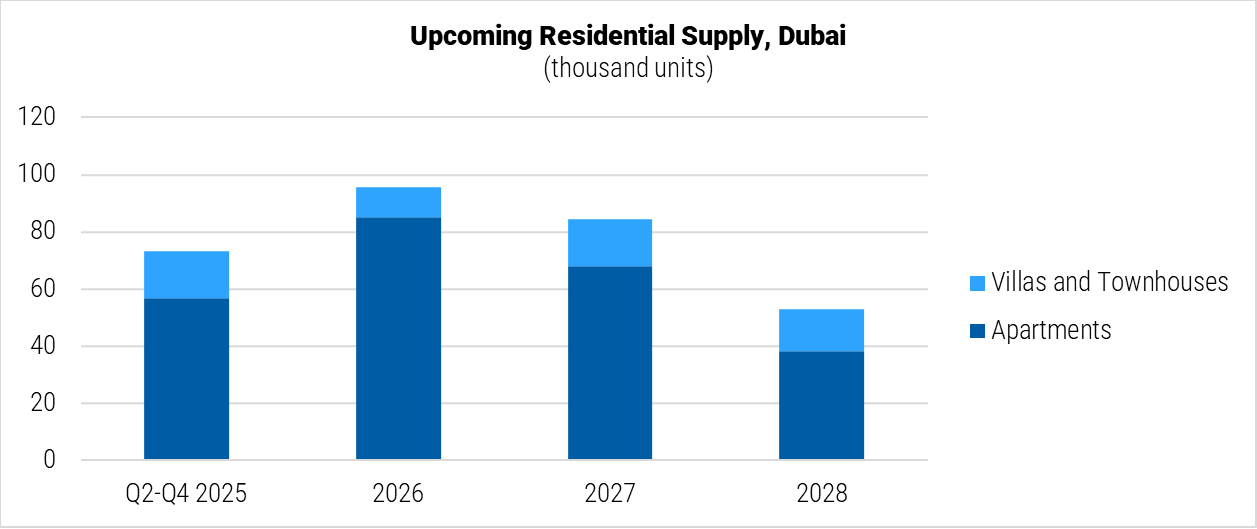
Data Sources: Property Monitor, Cavendish Maxwell.
In Abu Dhabi, according to Cavendish and Maxwell's data, approximately 600 residential units were delivered in Q1 2025, with around 11,900 more expected over the remainder of the year and an additional 7,000 projected for 2026. "While the upcoming supply pipeline appears robust, demand is expected to outpace supply in 2025, driven by population growth and increasing end-user interest <…> further supported by the Abu Dhabi Government's efforts to attract and develop knowledge-based industries, a strategy aimed at drawing international talent", noted the report.
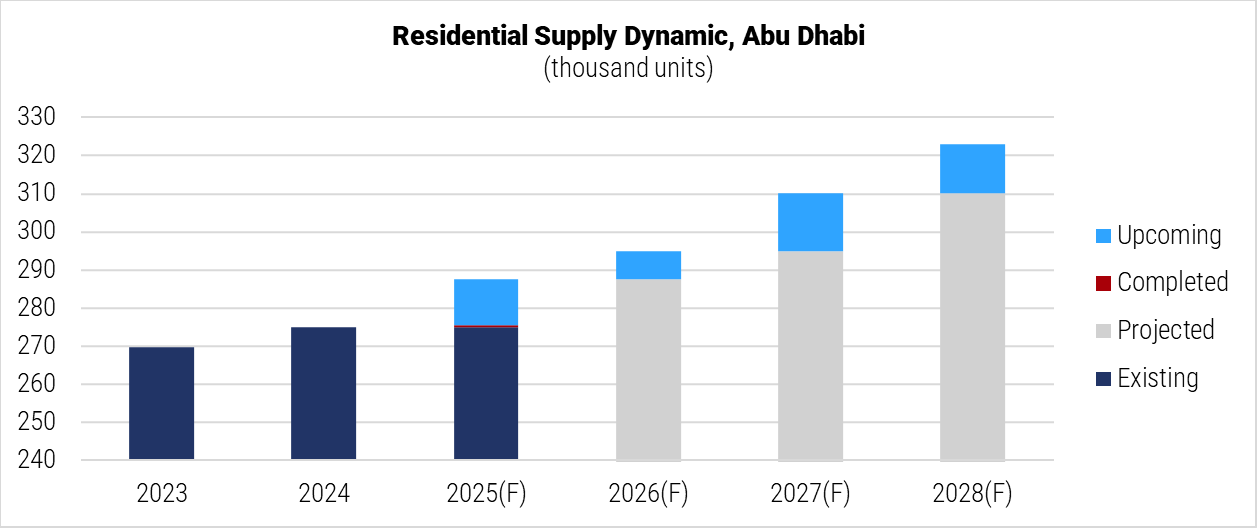
Note: Years marked (F) include forecast period. The project supply is based on the information available at the time of the research.
Data Sources: Cavendish Maxwell, MEED Projects.
Rental Market:
Rents Continue to Surge, Regional Dynamics Vary
The REIDIN Residential Market Rent Price Index continues to demonstrate substantial rental inflation in both Dubai and Abu Dhabi; however, the dynamic notably differs between the submarkets.
The annual rental growth for all residential properties in Dubai decelerated to 8.5% in May 2025, down from 14.3% in January and 21.1% a year ago. "While demand for housing remains strong amid continued population growth, the first quarter recorded the lowest quarterly rental growth in the past two years," real estate advisory firm Cavendish Maxwell explained in their latest report. "This slower pace of growth could be partly attributed to the influx of approximately 9,300 new units delivered in Q1 2025, as well as the introduction of the New Smart Rental Index, which may be influencing tenant expectations and price adjustments."
Additional units entering the market are likely to impact the Dubai market in the upcoming periods as well, believes the local real estate agency Betterhomes. "This substantial influx of new supply over the medium term will be a key factor to watch, alongside ongoing demand dynamics, as it may influence both property prices and rental rates," notes their Q1 2025 market report. "Projected supply remains elevated through 2027 and 2028, before tapering off towards 2029."
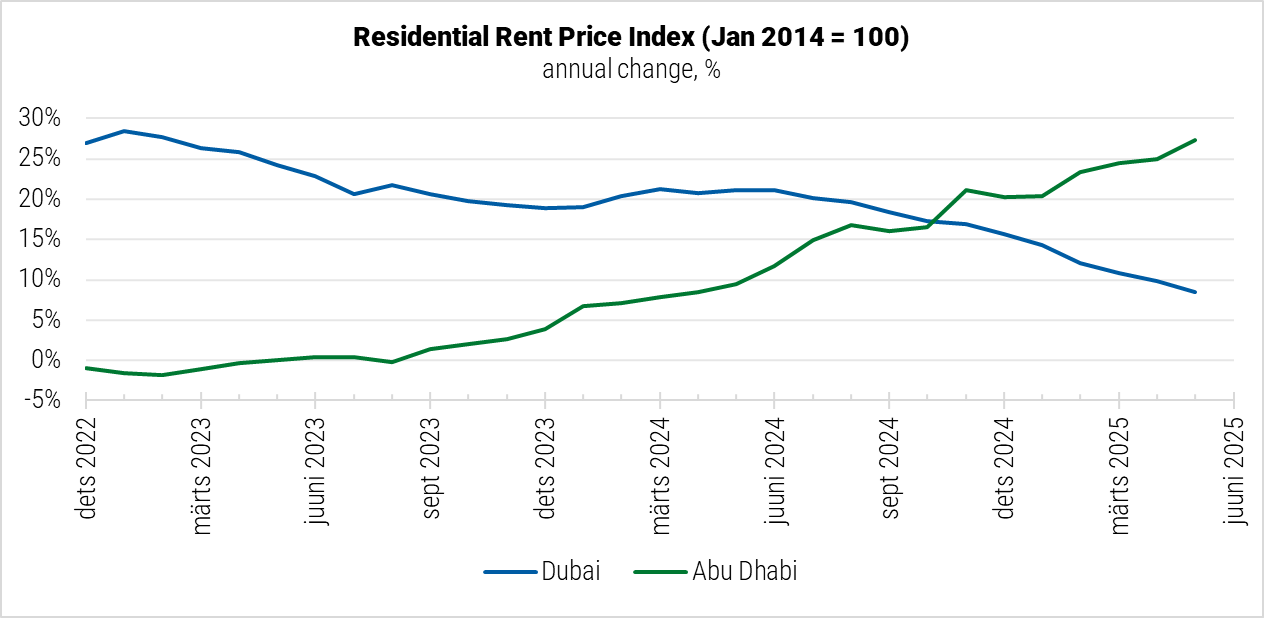
Data Source: REIDIN.
Moving in the opposite direction, annual rental growth in Abu Dhabi has been picking up pace, reaching 27.3% in May 2025, up from 20.4% in January and 9.4% a year ago. "As demand continues to outpace supply, occupancy rates have risen steadily, supported by population growth alongside an economic upturn and improvements in the job market that have encouraged a steady influx of expatriates," commented Cavendish Maxwell.
When it comes to property types, based on REIDIN figures, the Dubai submarket has been driven by apartment rents, which in May 2025 demonstrated a more pronounced growth (9.0% year-on-year) compared to villas (5.7% year-on-year). In Abu Dhabi, the two-digit rental inflation was also sustained by the apartments segment (32.1% year-on-year), while rents for villas showed a much more moderate increase (3.7% year-on-year).
Average annual rents by unit type and submarket:
| Unit type | Dubai | Abu Dhabi City | ||
| Q1 2025 (AED) | Q1 2025 (USD) | Q1 2025 (AED) | Q1 2025 (USD) | |
| Studio | AED 40,048 | USD 10,905 | AED 45,592 | USD 12,414 |
| 1-bedroom | AED 60,163 | USD 16,382 | AED 64,473 | USD 17,556 |
| 2-bedroom | AED 84,835 | USD 23,100 | AED 100,301 | USD 27,311 |
| 3-bedroom | AED 141,914 | USD 38,642 | AED 146,524 | USD 39,898 |
| 4-bedroom | AED 240,469 | USD 65,478 | AED 202,362 | USD 55,102 |
| Exchange rate USD 1 = AED 3.6725. | ||||
| Data Sources: Engel & Völkers, ADREC. | ||||
In nominal terms, the real estate brokerage firm Engel & Völkers reported average annual rent in Dubai at AED 84,835 (USD 23,100) for a 2-bedroom unit in Q1 2025. According to the report, for apartment leases, tenants preferred established communities such as Jumeirah Village Circle, Dubai Silicon Oasis, Dubai Marina, and Business Bay. In the villa and townhouse segment, high activity was seen in diverse communities across Dubai, including Mirdif, Damac Hills 2, and Emirates Living. Luxury communities like Bluewaters, Palm Jumeirah, Dubai Hills Estate, and Arabian Ranches outperformed other areas in terms of rent increases.
During the same period, in Abu Dhabi City, the average annual rent reached AED 100,301 (USD 27,311) for a 2-bedroom unit, according to the figures published by the Abu Dhabi Real Estate Centre (ADREC).
The research conducted by Global Property Guide in June 2025 showed gross rental yields for residential properties in the UAE at the average level of 4.87%, down from 4.94% previously reported in November 2024 and 5.27% in May 2024. The highest potential performance among the surveyed submarkets was estimated for rental properties in Dubai (6.31%) and Abu Dhabi (5.39%), while the lowest yields were observed in Ras al Khaimah (2.72%).
The REIDIN May 2025 reporting offers an even more positive assessment, estimating the residential market rental yields at 6.78% in Dubai and 6.97% in Abu Dhabi, with apartment yields reaching as high as 7.24% in Dubai and 7.63% in Abu Dhabi, while villas average at 4.95% in Dubai and 4.74% in Abu Dhabi.
Mortgage Market:
Demand for Housing Loans is Trending Up
With the Dirham pegged to the US dollar, benchmark rates published by the Central Bank of the United Arab Emirates (CBUAE) closely follow the trajectory set by the US Federal Reserve. In line with the American regulator's holding stance, in June 2025, the CBUAE kept its base rate applicable to the overnight deposit facility at 4.40%. The 3-month Emirates Interbank Offered Rate (EIBOR), often used as a reference in individual variable and hybrid mortgage products, stood at 4.14% at the end of the month.
Notable monetary policy relaxation in the second half of 2024 supported the improvement of lending conditions by banks in the UAE, some of which are now reportedly offering mortgage interest rates below 4% and making it easier for buyers to finance homes under 70-30 and 80-20 payment plans. Domestic and international banks in the country have a variety of home loan programs for citizens and foreign residents, typically based on a floating rate set as a combination of EIBOR and a fixed margin or a fixed rate during an introductory period of 1 to 5 years, after which the rate reverts to EIBOR plus the bank's margin.
At the beginning of this year, mortgage platform Holo estimated average mortgage rates on offer in Dubai at 3.90%-4.75% (fixed) and 5.50%-8.00% (variable). At the time of research in July 2025, First Abu Dhabi Bank, one of the country's largest lenders, offered home loans for residences and investments at fixed rates between 3.99% and 4.44% during the introductory period. Another prominent lender, Emirates NBD, posted indicative home loan rates between 2.14% and 6.00%.
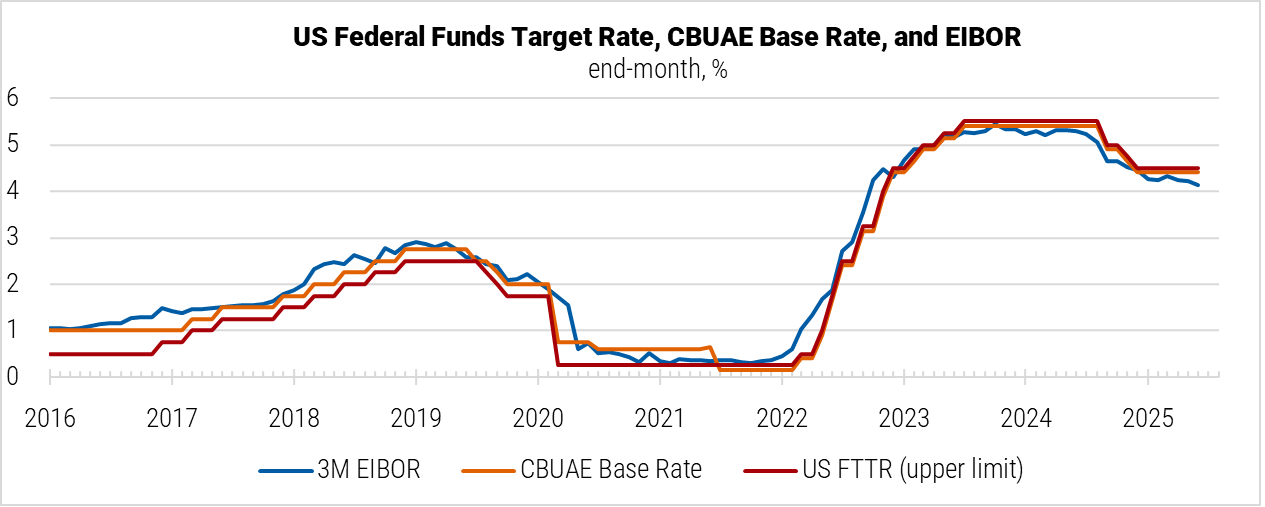
Data Sources: FRED, CBUAE.
Lower interest rates, along with improved economic conditions and rising incomes, are driving demand for personal loans, and home credit in particular, across all Emirates, the CBUAE noted in their Q1 2025 Credit Sentiment Survey. "Demand for personal loans keeps trending up <…> Expectations for the coming quarter remain positive, as financial institutions anticipate further growth in loan demand <…>. Housing (owner-occupier) loans, credit cards, and personal (other) loans saw the most significant rise in demand," said the central bank.
According to the data published by the UAE-based real estate advisory firm Cavendish Maxwell, Dubai registered 9,300 residential mortgage transactions in Q1 2025, a substantial 24% increase compared to the same period in 2024. In monetary terms, the value of these transactions reached AED 20.4 billion (USD 5.6 billion), also demonstrating a strong 46.8% year-on-year growth. The most pronounced annual increase in transaction volume (30.6%) was registered in the apartments segment, while villas posted the strongest annual increase in the total value of transactions (57.1%).
Looking ahead, the positive dynamic for the Dubai market could continue if supported by further improvements in lending conditions. "If the US Federal Reserve cuts interest rates in the coming months, borrowing conditions in Dubai could improve, potentially driving an increase in mortgage activity and supporting demand from both end-users and investors," said Cavendish Maxwell.
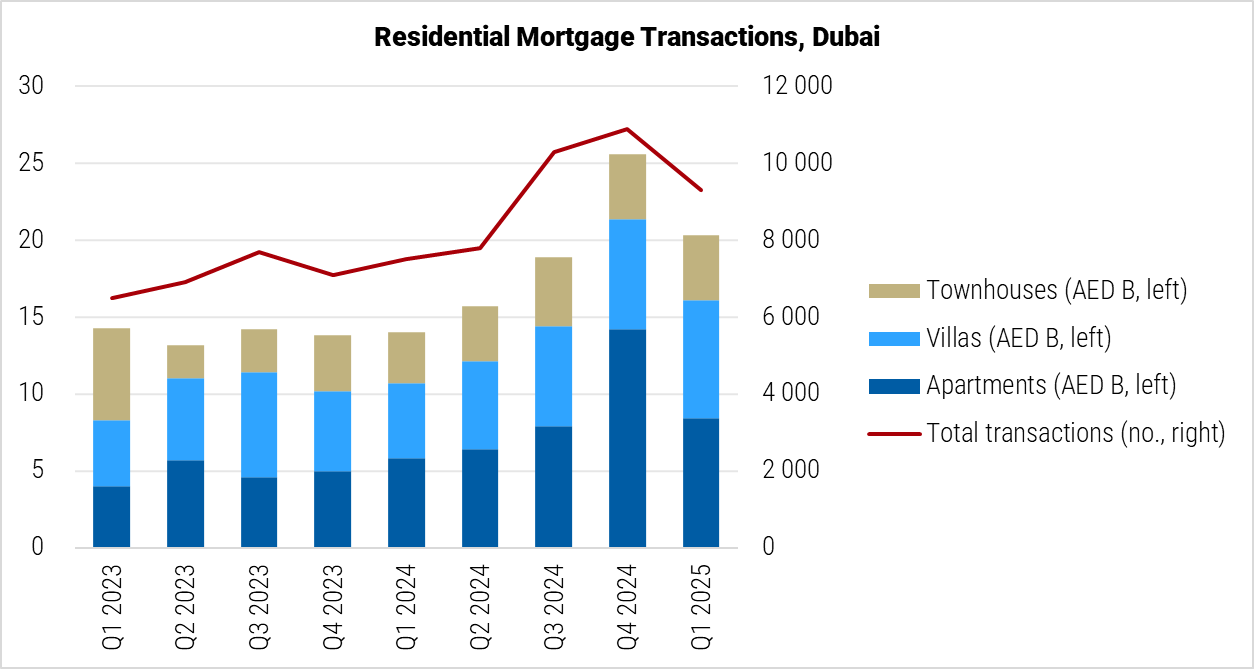
Data Sources: Property Monitor, Cavendish Maxwell.
In Abu Dhabi City, in line with the overall decline in sales transaction volumes, residential mortgage activity fell in volume in Q1 2025, primarily due to a reduction in mortgage transactions for apartments. Data published by Cavendish Maxwell shows a total of 800 mortgage transactions during this period, a 27.3% decrease compared to Q1 2024.
At the same time, the total value of transactions demonstrated a moderate annual growth of 6.3%, reaching AED 1.7 billion (USD 0.5 billion), which is attributed to increased buyer demand in the villas/townhouses segment. "Mortgage activity for villas and townhouses increased, indicating a shift in buyer composition this quarter towards end-users rather than investors," commented Cavendish Maxwell. "This trend highlights stronger end-user demand, which typically relies more on mortgage financing, particularly given the higher ticket prices associated with these property types."
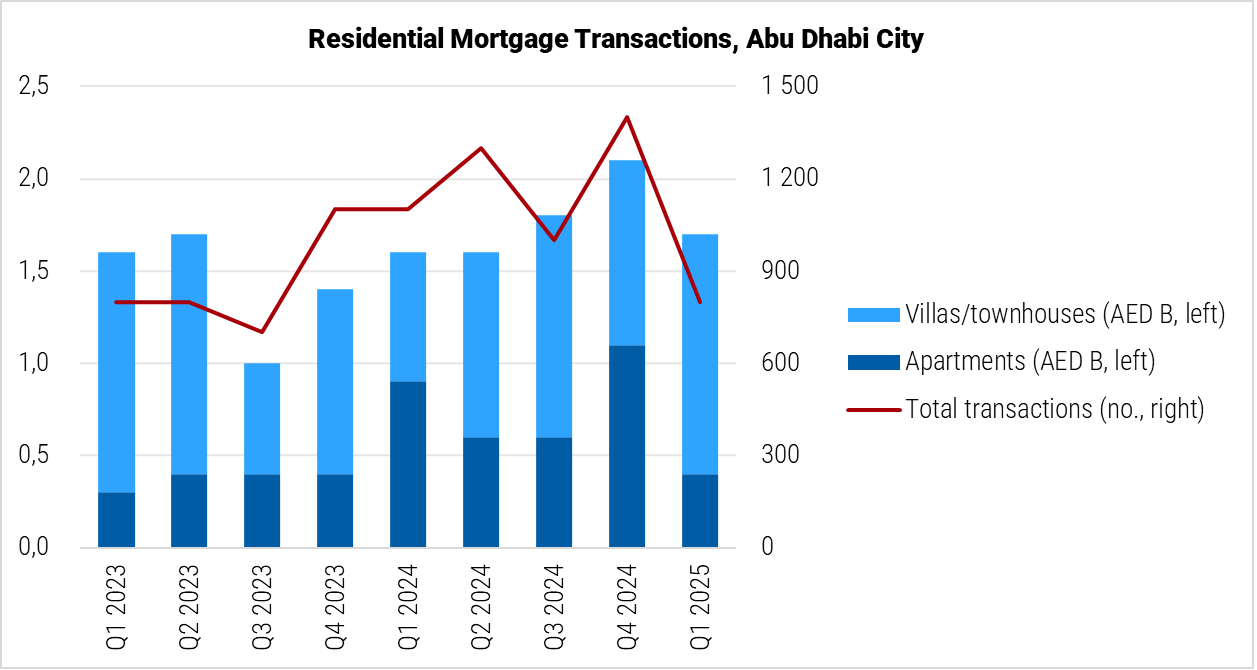
Data Sources: Property Monitor, Cavendish Maxwell.
Based on observations from local experts, a growing movement from long-term renting to homeownership is seen as one of the factors currently fueling demand for housing loans in the UAE. In their Q1 2025 report on Dubai, real estate agency Betterhomes also noted a shift in the balance between investors and end-users among the buyers, which reflects a growing number of long-term tenants choosing to purchase property, as mortgage payments become more affordable compared to rental costs. "In today's market, the gap between renting and owning has never been narrower," said Jeffrey De Souza, Head of Mortgages at Lomond (mortgage affiliate of Betterhomes). "With mortgage rates stabilizing and property values on the rise, buyers are seizing the opportunity to turn monthly payments into long-term equity."
Overall, however, cash buyers continue to dominate in the UAE's real estate market, despite the increased mortgage activity. According to the figures from the ADREC, as of Q2 2025, mortgaged sales comprised only 25% of all residential sales in Abu Dhabi. For Dubai, Knight Frank estimates that cash buyers contribute to 87% of all purchases.
Socio-Economic Context:
Growth Remains Robust as Economic Diversification Accelerates
Economic growth in the UAE remains strong, driven by robust domestic activity, with non-hydrocarbon growth benefiting from tourism flows and increased activity in construction, manufacturing, and financial services. In 2024, the real GDP growth remained relatively stable at 3.8%, after moderating from 7.5% in 2022 to 3.6% in 2023. The International Monetary Fund (IMF) currently projects growth to accelerate to 4.0% in 2025 and 5.0% in 2026.
While hydrocarbons remain the main source of revenue for the nation, the UAE continues to pursue economic diversification to mitigate fiscal vulnerabilities. Targeted public investments in AI and digital infrastructure are accelerating innovation-driven growth and expanding the knowledge economy in the country. "While hydrocarbons remain critical, economic diversification is accelerating to enhance resilience and reduce fiscal risks," pointed out the spring 2025 macroeconomic outlook from the World Bank. "The non-oil sector is expanding, supported by strategic investments."
Contributing to the overall economic growth, Dubai's tourism sector maintained strong momentum in Q1 2025, according to the latest economic review from the CBUAE. The city attracted 7.15 million overnight visitors (7% increase compared to Q1 2024) and posted a hotel occupancy rate of 83%. "This reflects a solid start that reinforces the city's position as a premier global destination," commented the central bank.
Consumer Price Index (CPI) inflation in the country has generally stabilized, averaging 1.6% in 2023 and 1.7% in 2024. The indicator was most recently reported by the Federal Competitiveness and Statistics Center (FCSC) at 1.14% in March 2025. The IMF forecast expects the 2025 annual inflation level to pick up slightly to 2.1%.
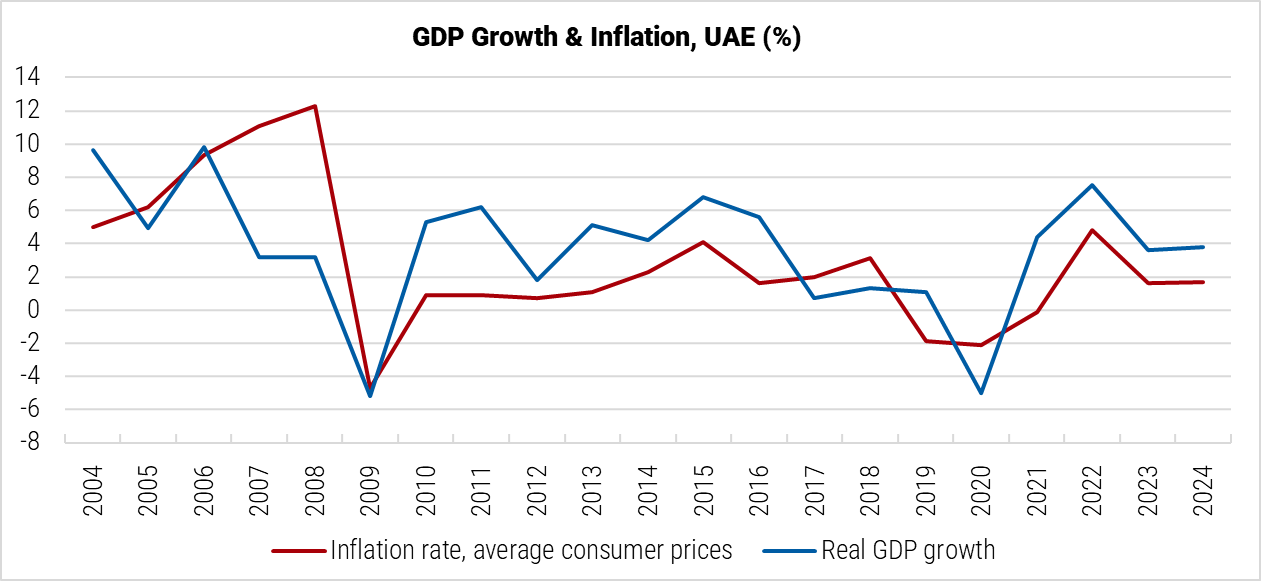
Data Source: IMF.
Amid the ongoing pivot from oil dependency to non-oil sectors like tech, renewable energy, healthcare, tourism, and finance, the UAE labor market is undergoing a transformation as well. While previously implemented policies such as long-term residency visas and improved labor protections enhanced workforce stability and strengthened the country's appeal to skilled migrants, additional efforts are required to modernize labor markets and close gender gaps, as noted in the IMF 2024 Article IV staff report.
While the overall unemployment rate is relatively low, having decreased from 4.3% in 2020 to 2.1% in 2024, according to the ILO estimates published by the World Bank, it remains twice as high (4.4%) for women and three times as high (6.4%) for the young population aged 15 to 24.
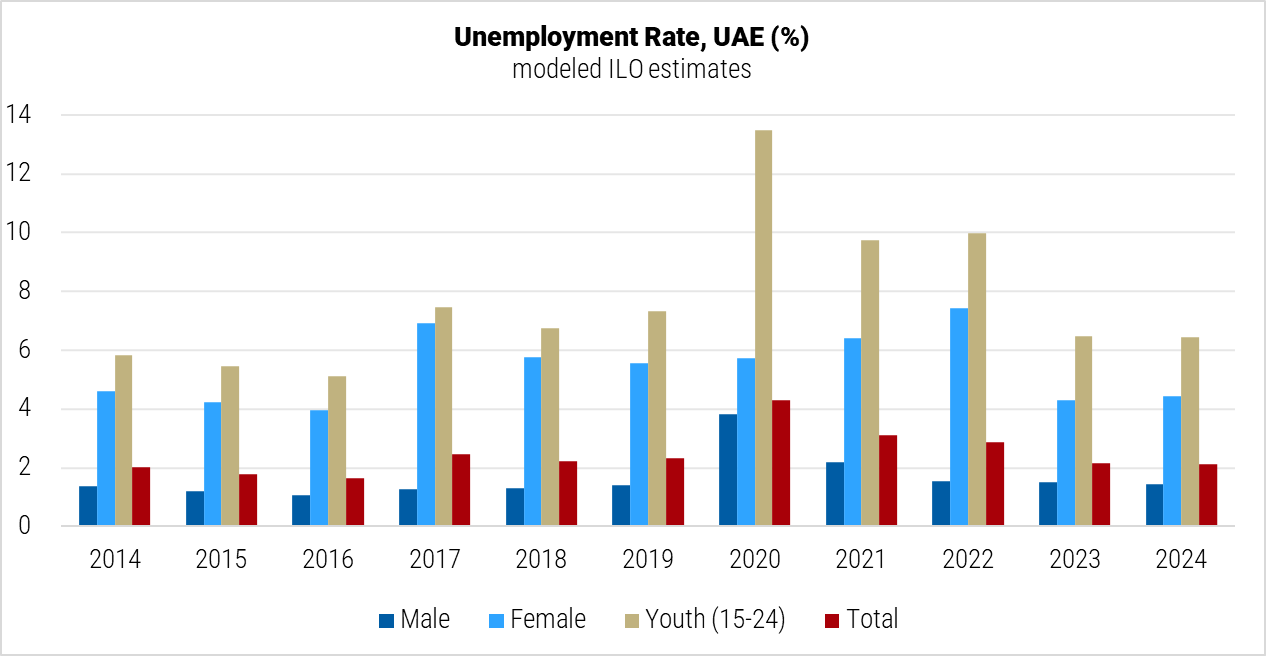
Data Source: World Bank.
Overall, the economic outlook for the UAE is positive, supported by the domestic non-hydrocarbon activity, continued reforms and related public spending, as well as a rapid expansion in hydrocarbon production, led by the OPEC+ quota increase from 2025.
At the same time, the CBUAE notes in their most recent economic review that growth projections for 2025 and 2026 are surrounded by considerable risks, such as unresolved global trade policy uncertainties and the more severe effects of lower oil prices on the non-hydrocarbon sector.
In June 2025, Fitch Ratings affirmed the country's 'AA-' standing with a stable outlook, noting that the current regional geopolitical escalation cycle is highly uncertain, posing a risk to Abu Dhabi's hydrocarbon infrastructure and to Dubai as a trade, tourism, and financial hub.
Sources:
- Federal Competitiveness and Statistics Center (FCSC)
- Prices - CPI: https://fcsc.gov.ae/
- Labor Force: https://fcsc.gov.ae/
- Central Bank of the United Arab Emirates (CBUAE)
- Quarterly Economic Review, June 2025: https://www.centralbank.ae/
- Credit Sentiment Survey Q1 2025: https://www.centralbank.ae/
- CBUAE Maintains the Base Rate at 4.40%: https://www.centralbank.ae/
- EIBOR Rates: https://www.centralbank.ae/
- Federal Authority for Identity, Citizenship, Customs & Port Security
- Real Estate Investors: https://beta.smartservices.icp.gov.ae/
- Dubai Department of Land (DLD)
- Real Estate Data: https://dubailand.gov.ae/
- Abu Dhabi Real Estate Centre (ADREC)
- Abu Dhabi's Real Estate Market Data: https://adrec.gov.ae/
- Digital Real Estate Ecosystem (DARI): https://www.dari.ae/
- International Monetary Fund (IMF)
- Country Overview: United Arab Emirates: https://www.imf.org/
- 2024 Article IV Staff Report: https://www.imf.org/
- World Bank
- United Arab Emirates MPO, April 2025: https://thedocs.worldbank.org/
- World Development Indicators: https://datacatalog.worldbank.org/
- DXB Interact
- Dubai Real Estate Market Report, Q2 2025: https://dxbinteract.com/
- REIDIN
- United Arab Emirates Residential Property Price Report: May 2025: https://reidin.com/
- Dubai Residential - The Rentennial - Examining the Rental Market Since 2015: https://reidin.com/
- Cavendish Maxwell
- Dubai Residential Market Performance Q1 2025: https://cavendishmaxwell.com/
- Abu Dhabi Residential Market Performance Q1 2025: https://cavendishmaxwell.com/
- Engel & Völkers
- Dubai Residential Real Estate Report (Q1 2025): https://www.engelvoelkers.com/
- Smart Rental Index by DLD: Understanding its Impact on Tenants & Landlords: https://www.engelvoelkers.com/
- Betterhomes
- Q1 2025 Dubai Residential Real Estate Market Report: https://www.bhomes.com/
- FY 2024 Market Report: https://www.bhomes.com/
- Knight Frank
- Dubai Residential Market Review - Q1 2025: https://www.knightfrank.com/
- Savills
- 2025 Middle East Outlook: https://impacts.savills.com/
- CBRE
- UAE Real Estate Market Review Q1 2025: https://mktgdocs.cbre.com/
- Property Finder
- UAE Q1 2025, Market Watch Quarterly Residential Real Estate Insights: https://www.propertyfinder.ae/
- Holo
- Average Mortgage Interest Rates In Dubai Explained: https://www.useholo.com/
- Emirates NBD
- Home Loans: https://www.emiratesnbd.com/
- First Abu Dhabi Bank (FAB)
- Home Loan for Residences and Investments in UAE: https://www.bankfab.com/
- Fitch Ratings
- Fitch Affirms the United Arab Emirates at 'AA-'; Outlook Stable: https://www.fitchratings.com/
- Dubai Property Prices to Drop but Issuers Have Rating Buffers: https://www.fitchratings.com/
- Arabian Business
- UAE Banks Fuel Real Estate Demand Surge With Lower Mortgage Rates, Extended Financing Facilities: https://www.arabianbusiness.com/
- Khaleej Times
- UAE Real Estate: Mortgage Financing Has Promising Outlook: https://www.khaleejtimes.com/